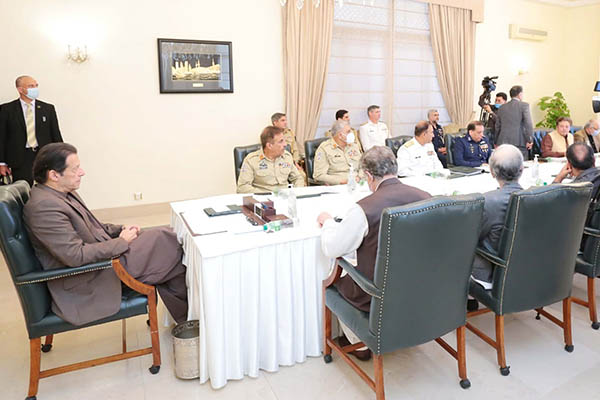
The 35th meeting of the National Security Committee. Photo courtesy PID
In statement after meeting of civil and military leadership, government claims proscribed group’s actions are furthering agenda of ‘external’ enemies
The National Security Committee (NSC) on Friday resolved to no longer tolerate any further breaches of law by the proscribed Tehreek-e-Labaik Pakistan (TLP), adding that the group was “deliberately” utilizing violence to create instability in the country.
Prime Minister Imran Khan, who chaired the 35th meeting of the NSC, stressed that no group or entity would be allowed to disrupt public life or use violence to pressure the government. The participants, read an official statement, noted that the TLP had resorted to violent street agitation several times since its first long march in 2017, making “unrealistic demands” that were used to gain political strength.
“In the process, the TLP’s actions have caused public disorder, serious economic losses to the country, besides boosting the morale of other terrorist outfits seeking to challenge the state’s writ,” read the statement. It said that the NSC had “unanimously” decided to guard Pakistan’s sovereignty from all internal and external threats and would not permit the TLP to challenge the writ of the state in any way.
Endorsing the government’s decision to negotiate with the proscribed group within the bounds of law, the NSC agreed that no leniency should be offered for any crimes committed by TLP workers. The prime minister, according to the statement, agreed with this view and instructed authorities to avail all necessary measures to enforce the law and protect the interests of the state and public.
According to the statement, the NSC praised police for their professionalism and restraint despite the TLP deliberately targeting them. It said that the state’s restraint should not be seen as a sign of weakness. The prime minister and the members of the NSC expressed condolences for the 4 policemen who have lost their lives in the agitation thus far and committed to compensating their families. Commending the exceptional performance of law enforcement agencies, Khan assured them that the government would support their efforts enforce the law and protect the public.
Emphasizing that the government recognized the right of peaceful protest of all Pakistanis, the NSC unanimously agreed that the TLP deliberately used violence against public property, state officials, and ordinary citizens to create instability in the country and this would not be tolerated. “All organs of the state stand ready to act, as per law, to protect the life and property of citizens,” it added.
During its meeting, the NSC also noted that the Pakistan Tehreek-e-Insaf (PTI)-led government had taken up the cause of Islamophobia and respect for Islam’s Prophet, adding that Pakistan had successfully raised these issues at various international fora, including the United Nations, Organization for Islamic Cooperation, and the European Union. “One key objective of establishing the Rehmatullil Alameen Authority is to intellectually counter international propaganda against Islam and the sanctity of the Prophet (PBUH),” read the statement.
It said that the participants of the NSC condemned TLP’s misuse of religion for political gains, claiming it was misleading the common man and creating internal discord within society. The TLP’s violence, it said, had ended up furthering the agenda of sectarian elements and external enemies of the state. It was also pointed out that all Muslims held the utmost love and respect for Islam’s Prophet, but no other Muslim-majority country had seen the level of violent agitation perpetrated by the TLP.
Earlier, security officials gave a detailed briefed to the NSC on Pakistan’s internal security situation and the ongoing agitation by the TLP. In addition to the prime minister, the meeting was attended by all relevant members of the federal cabinet, the national security adviser, the chairman Joint Chiefs of Staff Committee, all three services chiefs, and the chiefs of the Inter-Services Intelligence, Intelligence Bureau, Federal Investigation Agency, and other senior civil and military officials.
